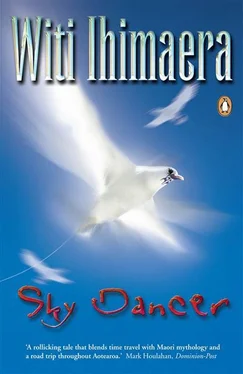“Should it be?” Skylark answered. She was still trying to get over the astonishment of an old woman singing to a tree, good grief. Now she was on her guard, suspicious of Hoki’s tears, and the way Hoki had of not answering the question to hand and, instead, tacking like a yacht in another direction. “Don’t think you can fob me off again,” Skylark warned. “What’s the tree or the twin mountains got to do with the planet Venus!”
Hoki sighed and wiped away her tears. “Skylark, dear,” she began, “not every question can be answered by going straight down the middle. Sometimes you have to take the long way home. This is why Maori like to answer by going in a circle. So humour a little old lady, because what you want to know about is all part of the same loop.”
Oh, it was so sneaky, really, how Hoki eased Skylark back into the spiral of storytelling.
“The twin mountains are renowned,” she began, “because Maori people regard them as being the closest point between the earth and the moon. In the time of the birds, they marked the very heart of the Great Forest. That eternal icon, the rainbow, arched overhead and, if ever you wanted to find the twin mountains, all you had to do was to look for the brightest rainbow in the sky. Why was it so bright? The celestial colours were made richer by the mist which was the very breath of the trees. Every morning the dew dazzled like emeralds. By afternoon the sun gleamed like greenstone. Came the evening and the Great Forest wore a garland of stars.”
Hoki looked at Skylark. Was any of this getting through or was she still off-line? Hoping for the best, Hoki turned to the tree — and a sense of awe and reverence flooded her voice.
“As for the tree, it was immediately acknowledged by all the landbirds as representing the Lord Tane, as being unto the image of Tane himself. Over those years it became their Jerusalem, if you like, venerated as a sacred site. Here, they congregated whenever they had issues to discuss, disputes to settle or matters of grave concern to vote on. It therefore became the venue for meetings of the Runanga a Manu — the parliament of birds.”
Hoki pointed at the branches of the tree. “The landbirds realised that their loosely linked confederation of different iwi needed a system of central governance. They appointed Chieftain Tui of the parson-bird clan to be their paramount leader, their prime minister as it were, and the ultimate arbiter of all things to do with landbird political, economic and cultural affairs. Along with Chieftain Tui, the landbirds also established a system of high-ranking ministers: Chieftain Ruru of the morepork clan was appointed because of his wisdom; Chieftain Kahu of the hawk iwi was appointed because of his warrior skills; and Chieftain Titi of the muttonbird clan was appointed because of his diplomatic experience. Below them, in hierarchical order based on whether they had wings or not, were all the chieftains of the other bird iwi. Of course, women were not regarded as having the same mana as men, so those women who led their iwi, like Te Arikinui Kotuku of herons, Te Arikinui Huia of huias, Te Arikinui Korimako of bellbirds and Te Arikinui Karuwai of robins, had branches lower to the ground where the wingless birds were.
“The most important branch,” Hoki continued, “was right at the very top of the sacred tree. It was called the paepae, the perch of chiefs. If you wished to speak, you spoke from there in the pecking order determined by your rank. Speak out of turn and you were howled down. Thus, when the seabirds began to mass against the landbirds it was only natural that —”
“That?” Skylark asked.
“Whakarongo koe ki au,” Hoki said.
She began the Third Lesson.
“Can you remember, Skylark, how the battle of the birds began? It started when the chieftain of the seashag clan, Karuhiruhi, was able to persuade all the other seabird chieftains to join him in a war to overturn the Great Division, a war against the birds of the land. He told them to assemble their troops on the offshore islands —”
The steady procession of manu moana to the pah of Karuhiruhi did not go unnoticed by the landbirds. The forest tribes lining the coast wondered about the squadrons of seabirds which blackened the sky from dawn to dusk. But it was Kawau, the rivershag, noting the sudden departure of the gulls and skuas from his bordering territories, who was the first to start putting two and two together.
“I must go and speak with Chieftain Tui,” Kawau thought. He wheeled away from his lagoon and flew inland toward the twin mountains.
“Tena koe, Kawau,” Tui said. He was a handsome chieftain with a feathered cloak of fine mazarine blue clasped at the throat with tufts of white curled feathers. He also had an eye for the ladies and, when Kawau found him at his official duties — on the paepae of the sacred tree — he was plucking the feathers of some very pretty constituents.
“Sir,” Kawau began, “I have grave news. The seabirds, led by Karuhiruhi of the seashag clan, are assembling at the offshore islands to attack us. I think they mean war.”
“War?” Tui asked.
Nothing fanned a cock’s ardour more than sex or the prospect of a fight. Tui had just enjoyed the former, so he was quick to turn his interests the latter.
“What is your evidence? What proof do you bring to me?”
Kawau was reluctant to tell of his own involvement in the story but was unable to avoid the chieftain’s probing questions. After all, Tui was the bird whose long beak could suck the deepest honey from the most challenging clematis flower.
“You have been a foolish rivershag, haven’t you,” Tui said. He pondered Kawau’s news. Not for nothing was he regarded as Commander-in-Chief of landbirds. He claimed his wisdom and mana from being a direct descendant of Parauri, one of the brothers of the Lord Tane, and one of the three guardians charged with the welfare and fertility of the Great Forest.
“Your report is serious. Similar intelligence has been coming in from other landbird clans throughout the Great Forest. What was missing from their reports, and what you have now given me, is the missing piece of the puzzle: the motive for the seabird movements. Put together, the movements and the motive — and greed is the only motive that makes sense — indeed add up to war.”
“What can we do about it?” Kawau asked.
Tui came to his decision. “We must call an extraordinary meeting of the Runanga a Manu. Let all assemble on the Longest Night before the Winter Solstice sunrise.”
He stood on the perch of chiefs, stretched his throat and with a cry sounding like a trumpet he called:
“Tui! Tui! Tuia !”
— 3 —
“Chieftain Tui’s calls passed through the length and breadth of the land,” Hoki said. “Each dawn it was passed during birdsong:
“‘Haramai nga rangatira manu whenua ki te Runanga! Tui, tui, tuia!’
“Throughout the confederation the message was passed from one iwi to the next, from one whanau to another. It was called through the Great Forest. It was called across the straits separating our islands. It was passed from small thrush to high-flying hawk. From kingfisher to wingless weka. From grebe to the mountain citadels of the kaka and the pastures of the moa.
“‘Haramai, haramai, haramai.’
“The Book of Birds tells us, Skylark, that it was to the paepae, to this sacred tree here, at the juncture of the twin mountains, that the birds journeyed —”
The chieftains came from the myriad pah, the many nesting places, of Te Tai Tokerau in the north, Te Tai Rawhiti in the east, Te Tai Hauauru in the west and from Te Waipounamu in the south — from the Hauraki, the Waikato, the Arawa, the Mataatua, the Kahungunu. You would have thought that because they had wings — well, most of them — the journeys of the manu whenua would have been speedily accomplished. Not so. Over the years they had developed intricate and highly sophisticated protocols which, by acknowledging ownership by the various landbird species of specific tribal territories, required rituals of encounter at every border before visitors could cross them. Their various fabulous and grand processions as hundreds of travelling parties through the whanau groups of the Great Forest were therefore slowed by the necessities of observing customary protocol. You never moved from one group to the next without paying the appropriate respects to that whanau, their dead, their living, and without due attention to your own whakapapa. Not only that but you also had to partake of kai, always a risky business as it meant you got fatter as you journeyed further. When you realise that the movements were further complicated by happening at various levels — on the ground, within the lower, middle and upper parts of the forest canopy, and in the open sky — you understand why the time taken for assembly in the twin mountains was dangerously overlong.
Читать дальше












